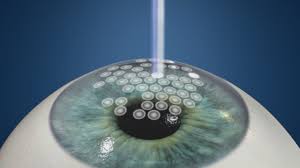PRK/EPI-LASIK
(PHOTOREFRACTIVE KERATECTOMY)
Like LASIK, PRK is a laser refractive surgery that reshapes your cornea to correct nearsightedness (myopia), farsightedness (hyperopia), and astigmatism.
Call Us: 215-928-3180
(PHOTOREFRACTIVE KERATECTOMY)
Like LASIK, PRK is a laser refractive surgery that reshapes your cornea to correct nearsightedness (myopia), farsightedness (hyperopia), and astigmatism.
Call Us: 215-928-3180
Like LASIK, PRK is a laser refractive surgery that reshapes your cornea to correct nearsightedness (myopia), farsightedness (hyperopia), and astigmatism. Unlike in LASIK where the treatment is performed underneath a flap, PRK is performed on the surface of the cornea. There are advantages and disadvantages to each, but both procedures are highly successful and ultimately the visual results for both procedures are equivalent.
 Because PRK is performed on the surface of the cornea, healing from the surgery takes longer than it does following LASIK. Patients who undergo PRK should expect a moderate degree of discomfort for a few days after surgery. This is because the top layer of the cornea, the epithelium, is removed during the PRK procedure. With the help of a bandage soft contact lens, the epithelium heals in a few days, at which point the pain resolves. Achieving your final clear vision after PRK also usually takes longer than it does with LASIK. Patients often experience fluctuating vision following PRK for several weeks as the cornea heals. During this time period, even though the vision is not immediately perfect, patients usually see well enough to resume work and drive within a few days following surgery.
Because PRK is performed on the surface of the cornea, healing from the surgery takes longer than it does following LASIK. Patients who undergo PRK should expect a moderate degree of discomfort for a few days after surgery. This is because the top layer of the cornea, the epithelium, is removed during the PRK procedure. With the help of a bandage soft contact lens, the epithelium heals in a few days, at which point the pain resolves. Achieving your final clear vision after PRK also usually takes longer than it does with LASIK. Patients often experience fluctuating vision following PRK for several weeks as the cornea heals. During this time period, even though the vision is not immediately perfect, patients usually see well enough to resume work and drive within a few days following surgery.
During your refractive surgery evaluation, your surgeon will have a detailed discussion with you about your lifestyle and goals to help determine which procedure(s) would be best for you.
Wills Eye Hospital proudly serves patients nationwide. While located in Philadelphia, we’re easily accessible to patients in Pennsylvania, New Jersey, and Delaware. If you are considering laser vision correction – LASIK, PRK or, ICL – schedule an evaluation with one of our refractive surgeons today!
